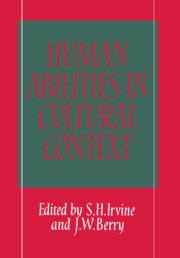Book contents
- Frontmatter
- Contents
- List of contributors
- Preface
- Acknowledgments
- Part I Human abilities in theoretical cultures
- 1 The abilities of mankind: A revaluation
- 2 A triarchic view of intelligence in cross-cultural perspective
- 3 The biological basis of intelligence
- 4 Speed of information processing and population differences
- 5 The factor model as a theoretical basis for individual differences
- 6 The meaning of item bias in ability tests
- Part II Cultural responses to ability measurement
- Part III Cultural limits upon human assessment
- Author index
- Subject index
1 - The abilities of mankind: A revaluation
from Part I - Human abilities in theoretical cultures
Published online by Cambridge University Press: 13 January 2010
- Frontmatter
- Contents
- List of contributors
- Preface
- Acknowledgments
- Part I Human abilities in theoretical cultures
- 1 The abilities of mankind: A revaluation
- 2 A triarchic view of intelligence in cross-cultural perspective
- 3 The biological basis of intelligence
- 4 Speed of information processing and population differences
- 5 The factor model as a theoretical basis for individual differences
- 6 The meaning of item bias in ability tests
- Part II Cultural responses to ability measurement
- Part III Cultural limits upon human assessment
- Author index
- Subject index
Summary
The law of cultural differentiation
Although standard measures of mental capacity have been used by psychologists for almost a hundred years, a unified theory of intellect has not emerged. In pursuit of that theory, many approaches have been tried and rejected. One of the most hardy has been the practice of comparing the performance of groups of subjects. Typically, the averages from cognitive tests have indexed cognitive differences between sexes, nationalities, ethnic and tribal groups, social classes and creeds, and even generations. For the purpose of data analysis, group membership acts as if it were a manipulated or independent variable, and the test score becomes the dependent or outcome variable. When significant variation exists between groups, meaning can be attached to the tests. Construct validation traditionally proceeds by accounting for performance differences by the characteristics that distinguish the groups from each other. In this guise, group membership has survived as a real-life projection of the need for laboratory control on batches of subjects in order to specify cause. A distant analogy to the principle of treatment variation in controlled settings, this line of enquiry and its conclusions have seldom had ready acceptance from within the discipline. On the fringes, and in the popular science journals, no single issue in human assessment has produced more debate and provoked more acrimony than the use of group performance in the construction of a theory of intellect. If this is so, why has the practice endured?
In the quasi-experimental use of group membership as a precursor to causal inference, another paradox exists. Although groups have served the same scientific purpose, they are often quite different from each other, as a little thought will determine.
- Type
- Chapter
- Information
- Human Abilities in Cultural Context , pp. 2 - 59Publisher: Cambridge University PressPrint publication year: 1988
- 10
- Cited by



